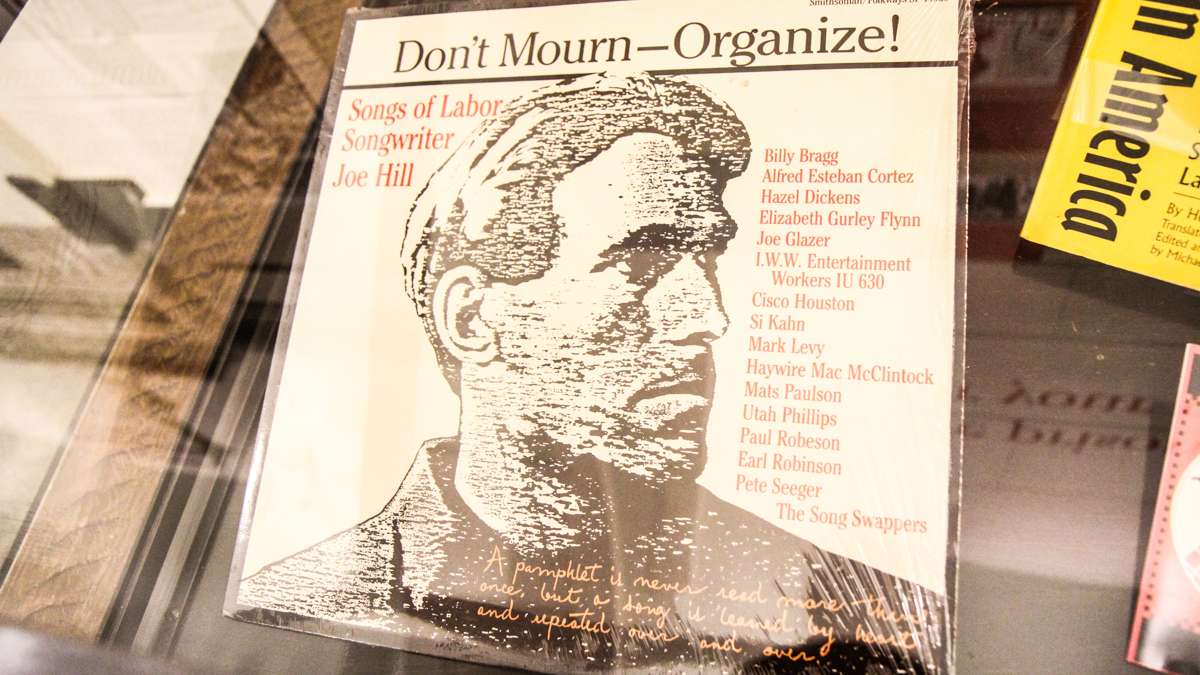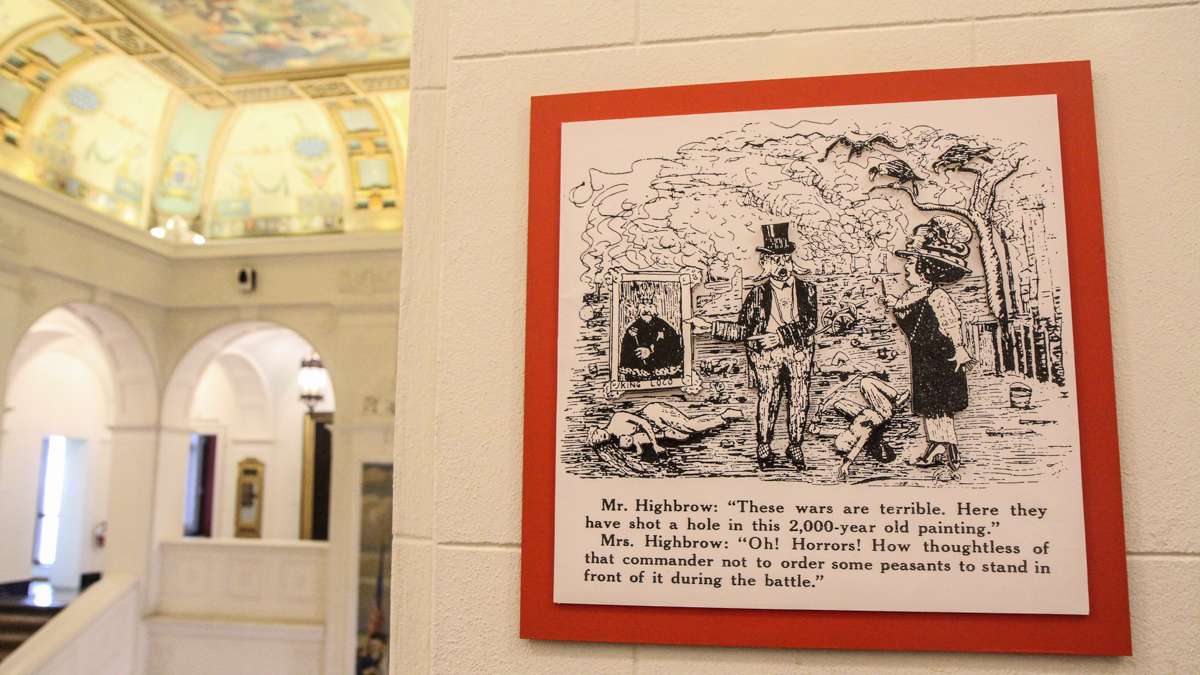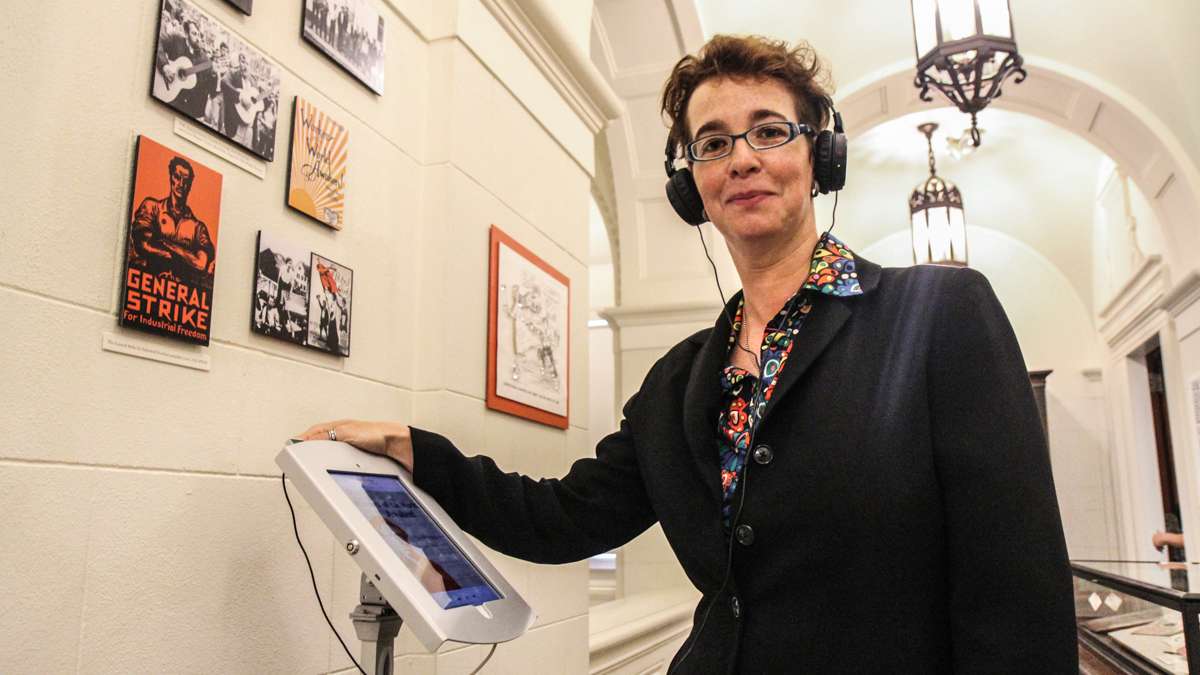Joe Hill, songwriter for union crowds remembered in South Philly
One hundred years ago in November, labor organizer and songwriter Joe Hill was executed by firing squad in a Salt Lake City prison for a murder he did not commit. He has become a martyr for the labor movement in the century since.
He is remembered in a small exhibition at the American Swedish Historical Museum, in South Philadelphia’s FDR Park.
Joe Hill was Swedish, born Joel Emmanuel Hägglund in 1879. He immigrated to New York at age 23, after both his parents had died, and almost immediately began hopping freight cars around the country as a migrant laborer. He washed dishes, swept floors, moved cargo on docks, picked crops and worked construction.His travels brought him to San Francisco in the aftermath of the devastating 1906 earthquake that leveled the city.
“I think that was a radicalizing moment for him. It really opened his eyes to just how greedy capitalism can become in the face of a crisis,” said Alexis Buss, co-editor of a forthcoming book of letters written by Joe Hill, and co-curator of the exhibition at the Swedish museum. “He also saw the flip side. He witnessed all kinds of expressions of human solidarity. He saw who was helping each other, and who was trying to profit.”
The exhibition, contained in a balcony hallway overlooking the lobby of the Swedish museum, traces the life and legacy of Hill with photos, reproductions of Hill’s editorial cartoons, and music. Hill wrote articles and songs for the Industrial Workers of the World (the Wobblies) a labor union quick to strike and agitate.Unlike later troubadours who tramped to demonstrations with a guitar slung over their backs, to sing songs of protest for the downtrodden, Hill was not a performer.
“He wrote the songs to be sung by crowds,” said Buss. “He picked up on what popular songs were of the day, and re-wrote them to be songs about struggles. So he took Tin Pan Alley songs and vaudeville songs, and wrote new lyrics. Everybody knew the tunes, and the union would pass out cards with the new lyrics.”
Although an immigrant with English as his second language, Hill had a gift for picking up local slang. His lyrics played with the vernacular of hobos and dockworkers
His song about a worker who resists organization — a scissorbill — is embodied in the character Scissor Bill.
Scissor Bill, he’s a little dippy,Scissor Bill, he has a funny face.Scissor Bill, should drown in Mississippi,He is the missing link that Darwin tried to trace.
“A lot of labor songs before Joe Hill were kind of floral and preachy,” said Buss. “Joe Hill’s songs were really funny, and ironic, sarcastic. They were so natural. It was something new.”
In 1914 Joe Hill appeared in a Salt Lake City hospital with a gunshot wound. It was the same night a store owner and his son were shot to death during a break-in. The law pinned the murders on Hill, despite having no motive and only circumstantial evidence. He was convicted and sentenced to death.
“Much of the trial was about his membership with the IWW, and how could he not be guilty, being a Wobbly who comes to take the profits of the copper mine bosses in Utah?,” said Buss.
Much of the material in Buss’ forthcoming book of Joe Hill letters was written during his imprisonment. He became a cause celebe, attracted support from people like Helen Keller and President Woodrow Wilson, who tried to stay his execution. The Swedish government, angered by the unjust treatment of one of its citizens, also tried to intervene.
Nevertheless, Joe Hill was shot to death on November 19, 1915.
“There is definitely a mythology around Joe Hill,” said Buss. “Joan Baez and Paul Robeson popularized ‘I Dreamed I Met Joe Hill Last night.’ Tom Morello from Rage Against the Machine has been singing it. Bruce Springsteen has been singing it. Whenever people want to remember a labor martyr, Joe Hill is the first idea. But he wasn’t completely comfortable with that status.”
One of the last letters Joe Hill sent out from his prison cell was a telegram to the secretary treasurer of the I.W.W.:”Don’t waste any time mourning. Organize!”
WHYY is your source for fact-based, in-depth journalism and information. As a nonprofit organization, we rely on financial support from readers like you. Please give today.










